Mosquito-proofing your home can be a difficult task, especially if you have small children or pets. DEET-based solutions are out of the window – studies show that DEET (in high enough doses) can cause sickness in both children and pets, even resulting in seizures and death for the latter.
So, human-made chemicals are a non-starter. You want forms of mosquito prevention that use natural ingredients, and you’ll discover 10 of those forms in this article.
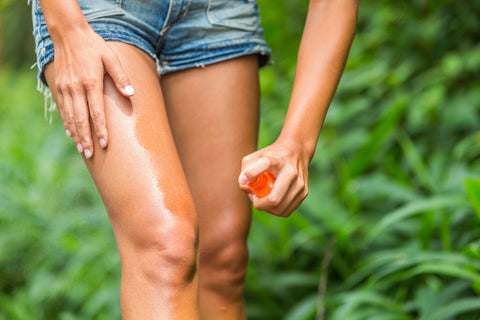
1 – Use Essential Oils
Proper use of a diffuser and the appropriate essential oils can be an effective way to deter mosquitoes by filling your home with scents that they despise.
And for that, there are three great options when choosing essential oils: citronella, lemongrass, and lavender.
Citronella
Long highlighted as a mosquito repellant, citronella has been scientifically proven to be almost as effective as DEET when you’re trying to ward off mosquitoes.
One study, published in the Tropical Medicine & International Health journal, discovered that citronella mixed with vanillin is capable of repelling the nasty little insects for up to three hours – perfect for your essential oil diffuser.
Lemongrass
Lemongrass contains citronella, which immediately highlights its effectiveness as a mosquito repellant based on the information you just read.
But if you need more proof of its effectiveness, a study published in Parasite Journal shows that mosquitoes (and several other types of flying insects) actively avoid areas where lemongrass oil is applied.
Lavender
Lavender may be even more powerful than citronella when it comes to keeping mosquitoes away.
According to a study published in the Malaria Journal, an essential oil solution containing at least 20% lavender can ward off the buzzing little nuisances for up to eight hours.

2 – Get Mosquito Repelling Plants
Building on the concept of using plant-based essential oils to keep your home mosquito-free, there are several plants you can cultivate in or around the property that have the same effect.
Anything that contains citronella is a good shout. But there are three other options when it comes to plants: marigolds, basil, and rosemary.
Again, it all comes down to compounds and odors. For instance, marigolds contain the pyrethrum compound – a scent-based anathema to mosquito hordes.
Basil is more direct, as it’s a mosquito larvae killer that destroys the bugs in their formative stages when used in just a 1.5% concentration in water.
As for rosemary, it contains several compounds, including camphor, a plant compound that offers up to 97.6% effectiveness in repelling mosquitoes.

3 – Sprinkle Some Herbs Around Your Home
Yes, herbs are plants. But they get their own section in this list because you can both cultivate them as plants and spread their shredded forms in the home to guard against mosquitoes.
As for which to use, there are two major herbs: peppermint and eucalyptus.
Different studies, one published in the Malaria Journal and the other in the Iranian Journal of Public Health, highlight the effectiveness of these herbs as repellants.
The one published in Malaria Journal found a single milliliter of peppermint oil (undiluted) had a 100% repellant effect, with the other study showing similar effectiveness for undiluted eucalyptus.
Given that the oils are so effective – giving you two more to add to your diffuser – the herbs from which they’re extracted can be just as powerful.
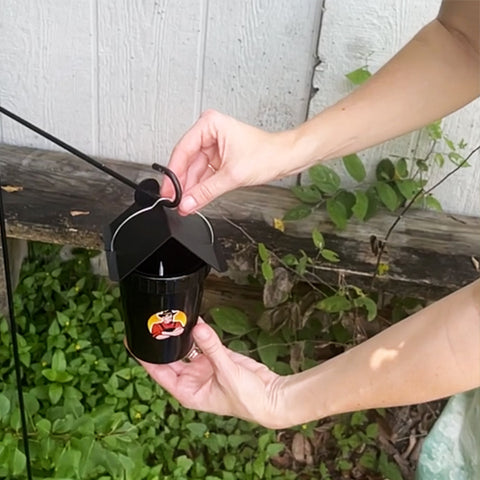
4 – Build DIY Mosquito Traps
So far, the techniques discussed have all been designed to keep mosquitoes away.
But what if that doesn’t work and you have the insects roaming around your home or garden?
Rather than repelling, you could try some techniques to attract them, which brings you to DIY mosquito traps: plastic bottles, sugar water, and yeast are a potent combination.
First – making the trap.
Slice the top of a plastic bottle, just below the neck, and add a fluid mixture containing a cup of warm water, about a third of a teaspoon of yeast, and four tablespoons of sugar.
Then, take the sliced-off portion of the bottle, flip it upside down, and place it into the bottom part of your bottle to create a funnel.
Finally, wrap the bottle in a black material, such as a bin bag, because mosquitoes are attracted to dark colors.
Voila, you have your trap. Mosquitoes will fly through the funnel and get stuck in the sugary water, ready for you to dispose of them.
Why does this work?
Studies show that mosquitoes can’t resist the sweet smell of sugar, to the point where researchers at Cardiff University are using these basic sugar traps to combat the little disease spreaders in sub-Saharan Africa.
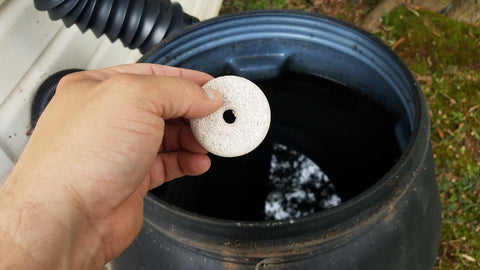
5 – Use Mosquito Larvicides
Once you have a few methods for taking care of adult mosquitoes, you can vary your attack to take them on when they’re at their most vulnerable – in their larval stages.
There are a couple of ideas you can use for mosquito larvicides: Bacillus thuringiensis (BTI) and mosquito dunks.
BTI is a chemical that is extremely toxic to mosquito larvae.
In fact, a study published in the Tropical Medicine and Infectious Disease journal says that it’s so effective that your problem isn’t going to be using BT – it’s finding an effective way to apply it.
Enter mosquito dunks.
These water-soluble rings dissolve in standing water to spread BTI throughout. Any mosquito larvae in the water are quickly terminated.
And best of all, the Environmental Protection Agency (EPA) says that the chemical has no toxicity to humans.
So, this isn’t necessarily an all-natural solution to your mosquito problem.
But it’s one you can apply easily by dissolving mosquito dunks into any constant standing bodies of water, such as ponds.
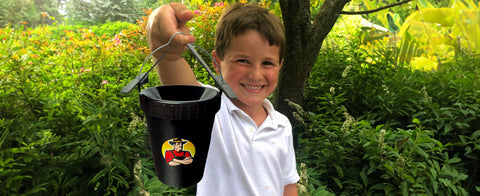
6 – Work on Outdoor Mosquito Control
Seeing as you’re already doing some work outside with your larvicides, why not extend the work by implementing some more mosquito control measures outside?
There are four actions that aid with mosquito control for the yard: vegetation trimming, mosquito repellant plans (citronella grass, lemon balm, catnip), outdoor fans, and mosquito netting.
Vegetation Trimming
Everybody knows mosquitoes love to drink blood (it’s why you want to get rid of them in the first place) but many don’t know that they’ll resort to drinking plant nectar in the absence of blood.
Hence, vegetation trimming – cut back on the sources of nectar and you ensure one less food source for the mosquitoes.
Mosquito-Repellant Plants
Having already covered several of these types of plants, there’s no need to go into too much detail here. Citronella grass and lemongrass work wonders for the reasons already described.
As for lemon balm and catnip, both are extremely powerful repellants. In fact, catnip actively triggers the TRPA1 receptors in mosquitoes, which is a pain receptor that makes the mosquitoes experience a natural aversion to catnip.
Outdoor Fans
The idea with fans is simple – place them around the garden to blow mosquitoes off-course.
They’re especially helpful when placed near garden furniture or other areas where people are likely to congregate.
Use a few of the fans and you create a veritable maelstrom that will cause the bug to buzz off rather than try to fight several wind currents.
Mosquito Netting
This type of netting can be placed over any openings that mosquitoes might use, such as the door to a summer house or shed.
You can also get netting for your pond – ideal for curbing mosquito breeding habits.

7 – Try Some Popular Home Remedies
Moving back into the home, there are also a handful of little ad-hoc remedies you can create that deter mosquitoes in the absence of other solutions.
These include the following home remedies: lemon eucalyptus oil, witch hazel, garlic paste, and citronella candles.
The oil and candles need no further explanation – you’ve already seen that lemon, citronella, and eucalyptus have mosquito-repellant powers.
As for witch hazel, it appears to be at its most effective when combined with mouthwash – Listerine is a popular choice – as the combination of mint and spice seems to be off-putting to mozzies.
Garlic is an interesting case, too.
Yes, applying garlic paste to the surfaces in your home means you’re going to have a smelly property for a while.
But that smell delivers results – garlic is extremely toxic to mosquitoes, with that toxicity lasting longer than that delivered by lemon to create a persistent mosquito killer that the bugs actively avoid.
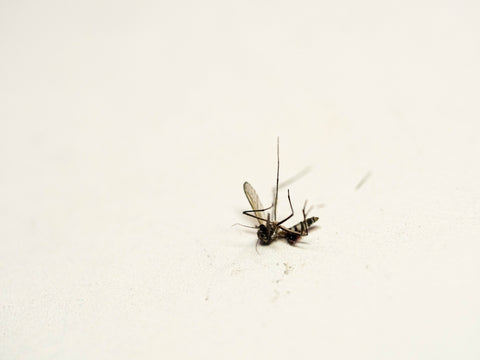
8 – Use a Water and Isopropyl Alcohol Solution
Let’s assume a mosquito has broken through all of your defenses and is roaming around your home.
Rather than trying to catch and kill it – the little bugs are surprisingly fast – you can use a spray to kill it.
That’s where a water and isopropyl alcohol solution comes into play.
Grab an empty spray bottle and create a solution that’s 30% water and 70% alcohol. Congratulations – you now have a very toxic combination for mosquitoes that can kill them almost instantly.
And even better, the alcohol solution can act as a cleanser for metal work surfaces in your home.
If you don’t want to go through the effort of buying isopropyl alcohol, just empty some rubbing alcohol into a spray bottle and use that.
After all, rubbing alcohol is just a water and alcohol solution, so it has the same effect.
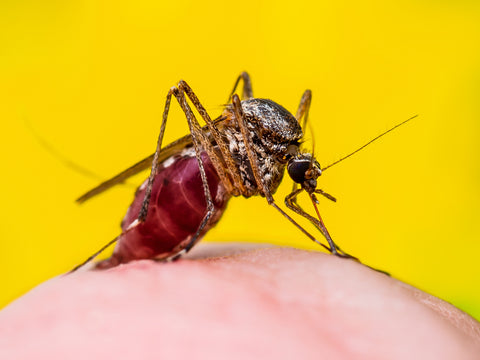
9 – Try Vinegar as a Repellant
Interestingly, you can look at a project submitted to the 2008 California State Science Fair to see that apple cider vinegar, in particular, can serve as a mosquito larvicide.
As part of this project, a student placed 15 mosquito larvae into a container before filling it with a solution of 15% apple cider vinegar and 85% water.
The result – all larvae were dead within 18 hours.
On a practical mosquito defense level, you could try pouring apple cider vinegar into any body of standing water that mosquitoes might use for breeding.
Alternatively, consider creating mosquito traps, following the solution ratio in the experiment, and placing them in humid and dark places. Even if a mosquito successfully lays eggs in the trap, the larvae that result will die long before they can take to the skies.
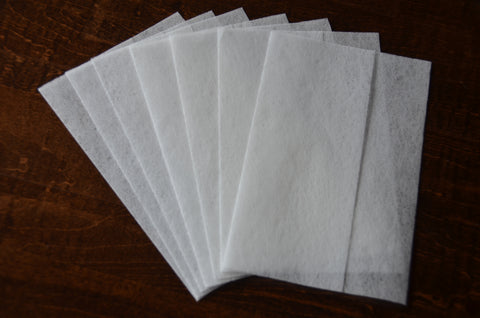
10 – Experiment with Dryer Sheets
Dryer sheets are an interesting option for repelling mosquitoes.
There aren’t any studies to demonstrate their effectiveness.
But at the same time, you may have them lying around the house, so there’s no harm in giving them a try.
The theory goes that these sheets contain a handful of chemicals that act as pesticides – geraniol, linalool, and beta-citronellol (that last one may ring some citronella-shaped bells).
The problem is that all reports of them working are anecdotal rather than science-based. It’s possible that the chemicals in the sheets aren’t used in a high enough concentration to have any effect on mosquitoes.
But that doesn’t have to stop you from placing a few around the house and experimenting with the effects yourself.
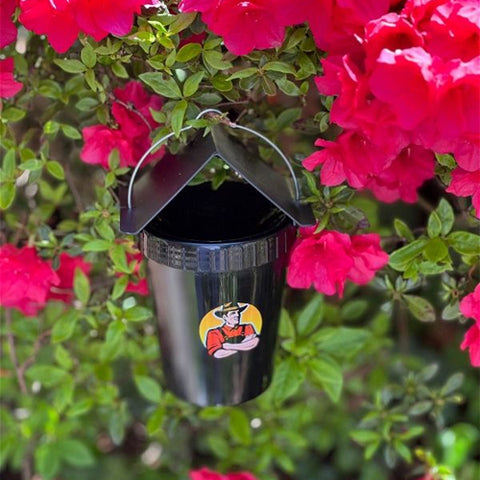
Go the All-Natural Route When Seeking Homemade Mosquito Repellants
All 10 of the mosquito control methods in this list are effective, though to differing degrees, and most of them are completely natural.
Even those that do contain human-made chemicals have them in such low doses that they’re not harmful to humans.
But these 10 aren’t you’re only options – Tougher Than Tom has several mosquito deterrents available if you want to ramp up your protection without spending time on homemade remedies.
In particular, a combination of its Mosquito TNT (outdoor buckets that work like sugar and yeast traps) and Mosquito Eliminator Spray help keep your home free of these malaria-spreading vermin.
FAQs
Is baking soda a good mosquito repellant?
Baking soda alone doesn’t repel mosquitoes.
But if you add it to vinegar (one part baking soda to four parts vinegar) you get a toxic solution that sticks the bugs in place so the vinegar can kill them.
Can I use Listerine as a repellant for mosquitoes?
You can, to an extent. Beyond its minty aroma, Listerine contains eucalyptol, which is proven to act as a mosquito deterrent.
The issue is that the amount used in the mouthwash is so small that Listerine alone likely won’t have much of an effect.
Combining it with witch hazel can help, as discussed above, but you’ll likely get better results from eucalyptol if you buy an essential oil and use a diffuser to spread its scent around your home.
How do I create Dawn Dish Soap bug spray?
Some people suggest that Dawn Dish Soap, when mixed with water, can serve as a pesticide that kills mosquitoes.
The generally accepted solution is a tablespoon of the soap in a quart of water, with the spray being applied to your plants to kill any insects (including mosquitoes) that infest them.
Does Pine-Sol work as a mosquito repellant?
There’s some anecdotal evidence pointing toward Pine-Sol effectiveness as a mosquito repellant, though nothing that has been confirmed by scientific studies.
What is known is that pine oil offers long-lasting repellant effects – between 88% and 100%, depending on the mosquito species – which may carry through to Pine-Sol.


